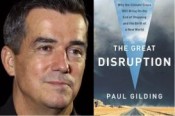Q&A: PAUL GILDING – Author, THE GREAT DISRUPTION
Written on October 2nd, 2014 |
Aired 06/10/12
PAUL GILDING says it’s time to stop worrying about climate change. We need instead to brace for impact because global crisis is no longer avoidable. He believes this Great Disruption started in 2008, with spiking food and oil prices and melting ice caps. It is not simply about fossil fuels and carbon footprints. We have come to the end of Economic Growth, Version 1.0, a world economy based on consumption and waste, where we lived beyond the means of our planet’s ecosystems and resources
According to Gilding, the coming decades will see loss, suffering, and conflict as our planetary overdraft is paid; however, they will also bring out the best humanity can offer: compassion, innovation, resilience, and adaptability.
Gilding says we must fight-and win-what he calls The One Degree War to prevent catastrophic warming of the earth. He believes the crisis offers us a chance to replace our addiction to growth with an ethic of sustainability, and an unmatched business opportunity as old industries collapse and new companies reshape our economy. In the aftermath of the Great Disruption, we will measure “growth” not by quantity of stuff but quality of life.
PAUL GILDING is an independent writer, advisor and advocate for action on climate change and sustainability. He has been involved with and led activist campaigns on a wide variety of social and environmental issues and served as Executive Director, Greenpeace Australia and Greenpeace International. Gilding founded Ecos Corporation in 1995, consulting to some of the world’s largest corporations on issues of sustainability until its sale in 2008. His first book is THE GREAT DISRUPTION: Why the Climate Crisis will Bring on the End of Shopping and the Birth of a New World.
Q&A: Peter Diamandis-Abundance Ahead
Written on March 28th, 2012 |
Aired 03/25/12
Recently the annual TED conference took place in Long Beach California. I have long recommended its famous 18 minute TED talks. Check out TED.com/talks, they cover a wide range of topics including science, technology, design, business, global issues and they have recurring themes of inspiration, challenge, and optimism. Not unlike what I try to do with this radio show.
On opening day the recent conference scheduled two talks one after the other. The first by Paul Gilding entitled The Earth is Full asked questions like Have we used up all our resources? Have we filled up all the livable space on Earth? Gilding suggests we have with the possibility of devastating consequences. In a talk that’s equal parts terrifying and oddly hopeful, he says “It takes a good crisis to get us going. When we feel fear and we fear loss we are capable of quite extraordinary things.”
That talk was followed by one by today’s guest, PETER DIAMANDIS, entitled Abundance Is Our Future in which he makes the case for optimism — that we’ll invent, innovate and create ways to solve the challenges that loom over us. “I’m not saying we don’t have our set of problems — problems – climate crisis, species extinction, water and energy shortage – we surely do. But ultimately, we knock them down.”
Since the dawn of humanity, a privileged few have lived in stark contrast to the majority. Conventional wisdom says this gap cannot be closed. But, according to a new book by Diamandis and co-author Steven Kotler, it is closing-fast. In Abundance: The Future is Better Than You Think, they document how progress in artificial intelligence, robotics, infinite computing, ubiquitous broadband networks, digital manufacturing, nanomaterials, synthetic biology, and many other exponentially growing technologies will enable us to make greater gains in the next two decades than we have in the previous two hundred years. They believe we will soon have the ability to meet and exceed the basic needs of every man, woman, and child on the planet.
http://www.abundancethebook.com
